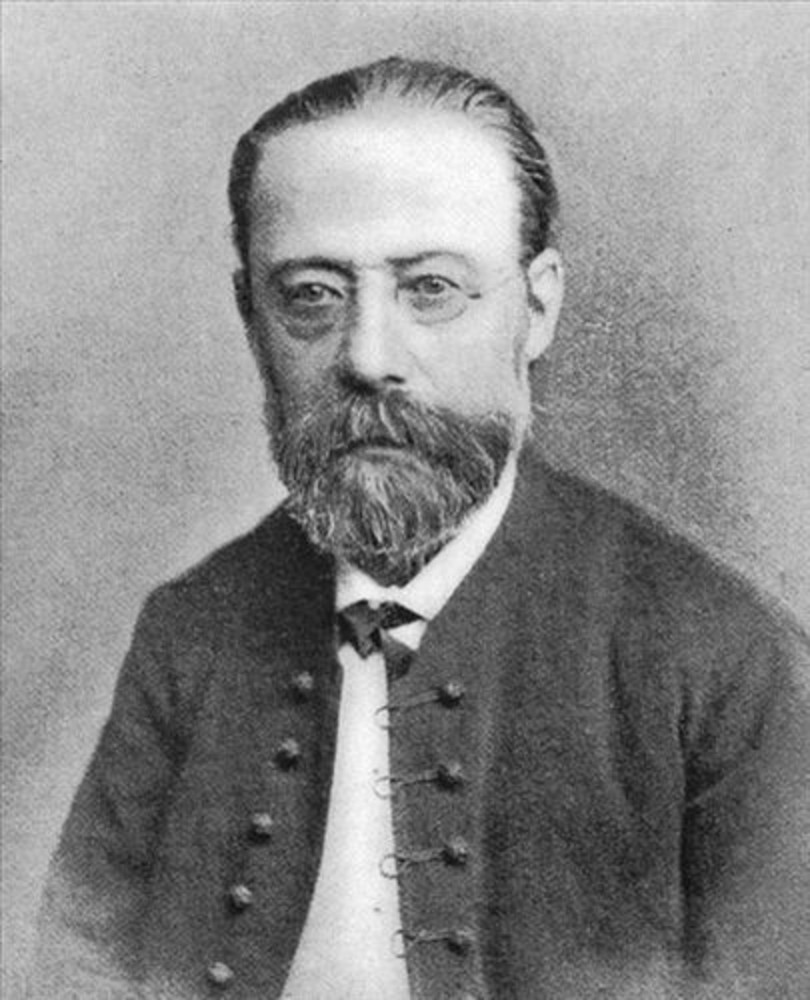
Smetana
Born: 1824
Died: 1884
Bedřich Smetana
‘With God’s help and grace, I will be a Mozart in composition and a Liszt in technique,’ Smetana wrote ambitiously in his diary in 1843.
Czechoslovakia as such did not exist in Smetana’s day. The lands of Bohemia merely constituted part of the Austrian Empire. During the 19th century, nationalist movements developed all over Europe, culminating in the ‘Year of Revolution’, 1848. It was the Prague uprising, during which the previously apolitical Smetana helped man the barricades, that helped in his development as the first composer to give a voice to Czech music. It took him some time to realise his ambition. ‘With God’s help and grace, I will be a Mozart in composition and a Liszt in technique,’ Smetana wrote ambitiously in his diary in 1843.
Prodigiously gifted as a child, he was able enough to play first violin in a Haydn quartet at the age of five and make his public debut as a pianist a year later. But because of parental opposition, his talent was not allowed to flourish immediately. At 19 he had had little formal training and his aim to become a great piano virtuoso like Liszt had spectacularly failed. Then luck started to play a part: his girlfriend Kateřina Kolářová persuaded her own music professor to give him lessons and simultaneously he became the piano teacher to the family of Count Leopold Thun, enabling him to write his first compositions. However, for eight years after the Prague uprising, Smetana made little progress (he married Kateřina but tragedy coloured their relationship – of their four daughters only one, Zofie, survived and Kateřina showed signs of tuberculosis from 1855).
In 1856, encouraged by Liszt, he made the bold step of moving to Gothenburg in Sweden and his life started to take shape. He attracted an enthusiastic band of pupils, he at last established himself as a pianist and he composed three symphonic poems (Richard III, Wallenstein’s Camp and Hakon Jarl) which attracted much attention. Kateřina died in 1859 and Smetana returned to Prague, having married the sister-in-law of his brother Karl the previous year. The political situation had improved and Smetana was now a mature composer with a reputation to reckon with. He knew Glinka’s nationalistic operas, with their Russian melodies and Russian librettos, and determined to do the same for Bohemia. He was given the important job of music director of the Prague Provisional Theatre and his first opera, The Brandenburgers in Bohemia (1863), made use of his new credo.
Three years later he wrote his masterpiece, The Bartered Bride. His six other operas show a remarkable versatility in their different styles and content but The Bartered Bride remains the only one in the general repertoire outside Prague today. The 1870s saw Smetana at the height of his creative powers with such original and remarkable works as his cycle of symphonic poems Má vlast (My Country) and his wonderful E minor String Quartet, inspired by reflections of his youth. Smetana ended his days suffering from the effects of syphilis. He had become totally deaf, suffered from headaches and hallucinations and frequently lost the power of speech. Having ceased to appear in public, he lived with his daughter Zofie and her husband in the country, before being confined to an asylum.

Gramophone Digital Club
- Digital Edition
- Digital Archive
- Reviews Database
- Full website access
From £8.75 / month
Subscribe
Gramophone Full Club
- Print Edition
- Digital Edition
- Digital Archive
- Reviews Database
- Full website access
From £11.00 / month
Subscribe
If you are a library, university or other organisation that would be interested in an institutional subscription to Gramophone please click here for further information.





